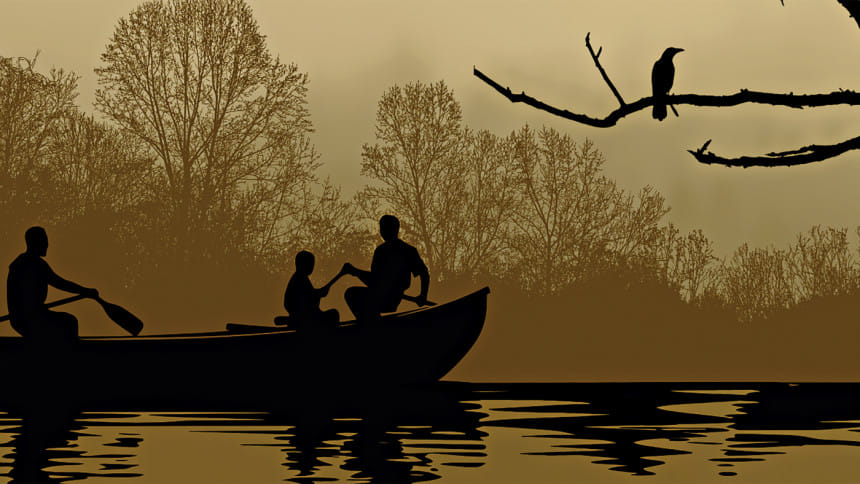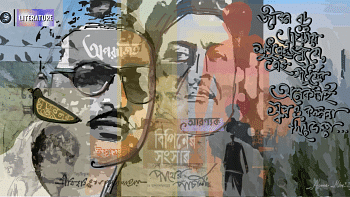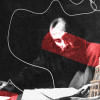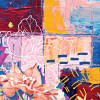Accursed

A very strange thing happened in my life then.
It was about three years ago. I had to visit a place near Barishal on business.
I got on a boat from a bazaar in that area around noon. There was a man from Barishal on the same boat. Time passed by in gossip.
It was just after puja. The sky remained cloudy throughout the day. It began to rain occasionally. But the sky became a bit clearer moments before the evening. The light of the chaturdashi moon was revealed gradually through the broken clouds.
As soon as evening fell, we left the big river and came to a canal—we heard that the canal began from here and united with the river Meghna passing through the north of Noakhali. It was my first time going to East Bengal; everything appeared new to my eyes. The chaturdashi moon glittered behind the clouds in the rain-bathed screw pine jungle on the two sides of the narrow canal. There were big fields on the bank of the river at intervals. In certain places the zedoary, cane, and fern bushes bent towards the water of the canal…Though it was cold outside, I sat out of the chei watching everything…That part of Barishal was close to the Sundarbans. Small lakes and canals were everywhere, and the sea was not very far—Sandiwp and Hatia were only 10 or 15 miles southeast. The night grew late. The solitary jungle on both sides of the canal appeared strange in the dim moonlight. In this part, there was no habitation, only dense forests and big hogla trees by the water.
My companion said, "Don't stay outside at this time of night. Come inside the chei. In this jungle—Do you understand?"
He began to tell many stories of the Sundarbans—of how his uncle was supposed to have worked in the forest department, and how he had visited many parts of the Sundarbans on his launch.
It was almost 12 o'clock at night.
We only had one steersman on our boat. He said out loud, "Babu, there will be a big river ahead. I cannot cross the river alone at this time of night. Let's keep the boat here."
The boat was tied down at that very place. Meanwhile, the moon had set behind the big trees; I saw big woods engulfed in darkness on the two sides of the narrow canal. There was no sound; even the insects had fallen silent…I said to my companion, "Mister, the lake is so narrow—Won't tigers jump on the boat from the banks?"
My companion said, "I'll be surprised if they don't."
Hearing this, I sat against the chei in great astonishment. We sat for a while, and then my companion said, "Come, let's lie down a bit. We won't be able to sleep, and we shouldn't sleep, but let's close our eyes for some time."
I remained silent for a while, and when I went to call my partner I saw he had fallen asleep. I did not think that the steersman was awake either. I thought then, "Why should I stay awake for no reason?" I made preparations to follow in the footsteps of great men.
What happened next was an uncanny experience. When I was about to lie down, I heard someone playing the gramophone somewhere deep inside the jungle, on the other side of the dark woods…I sat up in a hurry—gramophone? Who would play the gramophone at this time of night, and that too in the middle of these dense woods? I listened carefully. It was not a gramophone. From where the dark hijol hintal forest grew dense, someone was saying something in a loud, afflicted voice…After listening to it for a while, I felt it was the combined voices of more than one person. This was almost like the music which comes from the roof of the neighbour's three-storied building—a bit intelligible, a bit unintelligible, but still a nice unbroken melody reaches the ear. Incomprehensible Bangla words reached my ears, but I could not discern what they were. The sound lasted only a few minutes, and then the dark forest became as silent as before…I quickly came out of the chei. The surrounding darkness was as black as luffa seeds. The forest was silent except for the murmur of the ebbing water beneath the boat and a kind of incomprehensible noise in the screw pine bush by the water due to the late-night breeze. The trunks of the black hijol trees away from the bank assumed a strange look in the darkness.
I thought of waking my companions. Then I thought, the poor fellows were sleeping—what was the point in waking them up? It would be better if I stayed awake. I lit a cigarette while standing. When I was about to go back inside the chei, a clear, loud and afflicted sharp noise, resembling the drone of crickets, pierced the breast of the concrete darkness like an arrow and reached the sky from somewhere in the vast forest: "Hey! Passengers of the boat, who are you? Are you there? We are suffocating to death…please save us."
The steersman of the boat woke up in a hurry. I called my companion, "Mister, oh Mister, wake up! Wake up!"
The steersman pressed against me; his voice was trembling with fear. He said, "Allah! Allah! Did you hear, babu?"
My companion woke up and asked, "What, what, Mistter? Why did you call me? Is there a beast or something?
I told him the matter. He also climbed out of the chei quickly. The three of us listened together, carefully. Everything fell silent again…The ebbing water made a greater sound than before, pooling beneath the boat.
My companion asked the steersman, "What is it then?"
The steersman replied, "Babu, Kirtipashar Gour is on the left."
"Then why did you tie the boat here at this time of night? You fool!"
"I tied it here as there are three of us. It was not possible to pull back the boat against the ebbing tide," said the steersman.
Listening to the nature of their conversation, I asked my companion, "What, Mister, what is the matter? Do you know anything?"
It was not in fear as much as it was in astonishment that we all had become alarmed. My companion said, "Oh, you! Light your kerosene lamp. Let's sit with the lights on. There's still a long night ahead."
I asked the steersman, "Did you hear the sound?"
"Yes babu," he said, "the sound woke me up. I've heard this call twice before while steering my boat."
My partner said, "This is a strange incident that happens here. But as this place is near the fringes of the Sundarbans and as there is no human habitation here, it is only familiar to the boatmen. There is history behind it, but that is not well known to the boatmen. Let me tell you instead."
I began to listen to the history of Kirtipashar Gour in the smoky light of the kerosene lamp amid the bosom of the dark forest.
This is an excerpt from Bibhutibhushan Bandyopadhyay's short story "Abhishapta", translated by Dipty Rahman.
Dipty Rahman is a lecturer in the department of English, American International University-Bangladesh (AIUB).

 For all latest news, follow The Daily Star's Google News channel.
For all latest news, follow The Daily Star's Google News channel. 










Comments